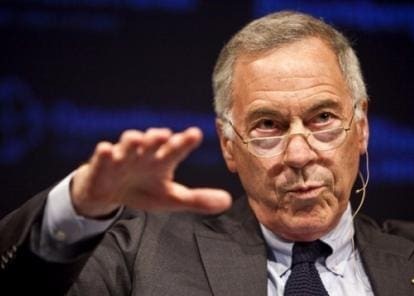
Hanke: Dollarization Helped Ecuador
Dollarization has produced Ecuador’s longest period of economic stability.
LATINVEX SPECIAL
In this interview with Ecuadorian newspaper Expreso, currency expert Steve Hanke talks about the dollarization in Ecuador in January 2000. Hanke is a Professor of Applied Economics and Founder and Co-Director of the Institute for Applied Economics, Global Health, and the Study of Business Enterprise at The Johns Hopkins University in Baltimore.
Expreso: What do you remember about the implementation of dollarization in Ecuador and the challenges faced at that time?
Hanke: The first big thing that I remember about the implementation of dollarization in Ecuador is that President Mahuad had chosen an exchange rate of 25,000 sucres per dollar for the conversion. I thought that this rate was picked in an arbitrary manner and was incorrect. As a result of what I thought was an excessively low value for the sucre, I knew that it would take way more time for Ecuador’s inflation to converge with that in the U.S. As it turns out, I was correct.
The second big thing that I remember was all the stupidities that were given for why dollarization was inappropriate and wouldn’t work. These stupidities were coming from many quarters—including Michel Camdessus, who was the Managing Director of the IMF; Rafael Correa, who became the President of Ecuador; Paul Krugman, who won the Nobel Prize in Economics in 2008; and many other notables. These stupidities amused me because I had just designed and implemented the “dollarization” of Montenegro, where I was a member of the government and the chief advisor to President Milo Đukanović. In Montenegro, we replaced the Yugoslav dinar with the German mark in very difficult circumstances in 1999, and it worked perfectly, as all dollarization around the world had before.
So, I knew that the critics didn’t know what they were talking about.
Expreso: How do you evaluate Ecuador’s economic performance over the past 25 years under dollarization?
Hanke: Overall, Ecuador’s dollarization has worked very well. It is the longest-lived currency regime in Ecuador’s history. It has produced the longest period of economic stability in Ecuador’s history. This was accomplished in difficult circumstances. Dollarization has survived two coups, two unnecessary defaults, an international financial crisis in 2008, a crippling earthquake, a constitutional change, and the COVID pandemic. Perhaps most importantly, it survived the nefarious Correa government, which was hostile to dollarization and worked hard to undermine it. As they say, the proof of the pudding is in the eating, and that’s why dollarization remains popular with the Ecuadorian public.
Expreso: What do you consider the greatest strength and the biggest limitation of Ecuador’s dollarized system?
Hanke: Dollarization’s strength is that it provides monetary and economic stability. And while stability might not be everything, everything is nothing without stability. For developing countries like Ecuador, there are no downsides associated with replacing their inferior domestic currencies with a superior foreign currency.
Expreso: What structural reforms should Ecuador consider to revitalize its economy under a dollarized regime?
Hanke: The list of structural reforms that would improve Ecuador’s economic performance is long. But, the first thing I would do would be to mothball the central bank and put it into a museum.
Expreso: How much fiscal policy flexibility does Ecuador have without its own central bank?
Hanke: Ecuador has a central bank. With dollarization, there is no need for a central bank, so it should be retired.
Expreso: Do you think dollarization remains sustainable for Ecuador in the long term, given rising public debt?
Hanke: Yes. As for Ecuador’s debt, the constitution should be changed to include a debt brake, like the one introduced in Switzerland in 2003.
Expreso: What warning signs would indicate that dollarization is at risk in Ecuador?
Hanke: The only warning sign that would indicate that there was a problem with dollarization would be a collapse of the United States.
Expreso: What lessons can Ecuador learn from other dollarized countries or those with currency boards?
Hanke: With dollarization, it’s best not to have a central bank. After all, there is no need for one. In a dollarized system, the only thing the central bank can do is engage in mischief.
Expreso: What message would you give to Ecuadorian policymakers and citizens about the future of dollarization?
Hanke: Ecuador’s future is dollarization.
This interview appeared in Expreso on January 6, 2025. Republished with permission from Steve Hanke.
RELATED ARTICLES
Ecuador: Dollarization Turns 25












